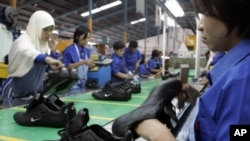A factory in Indonesia that makes sneakers for Nike has agreed to pay about $1 million in overtime to 4,500 workers, under a settlement between a workers' union and factory management.
The settlement between the Serikat Pekerja Nasional labor organization and management at the P.T. Nikomas factory, three hours outside of Jakarta, reflects more than 500,000 unpaid overtime hours that workers put in sewing Nike sneakers at the plant during the past two years.
Jim Keady, a worker's rights advocate with Educating for Justice, worked with the union to initiate the lawsuit last February. He said the factory got off easy with a $1 million settlement for the last two years, because the practice of forcing workers at the plant to work extra hours without pay had been going on for almost two decades.
“In February, I was meeting with the local trade union there and they shared with me this issue of 'jam molor,' the hour of delay, Keady said. "It is basically the hour that workers in the sewing sections were being forced to stay on the line without being paid. And they shared with me that this was happening for, almost every day for an hour, for the last 18 years.”
Keady said his organization has been focusing on Nike's treatment of workers in Indonesia for the past 14 years and helped expose Nike's use of child labor in the 1990s. Since then, the footwear giant has taken measures to improve labor conditions in the independently owned factories where its products are produced.
Although management at the P.T. Nikomas factory initially denied the allegations, Nike and the union sent in investigative teams that confirmed the union's claims.
Nike released a statement saying it “commends the factory on their action plan and efforts to correct inadequacies in current policies designed to protect the rights of workers.”
Although conditions in Nike factories have improved in the last decade, wages remain stagnant at less than $150 a month and the company is still not willing to directly engage the union, Keady said.
“On the two key issues, wages and having tri-party collective bargaining agreements that, you know, Nike, the factory and the trade unions sit down and hash out a deal there has been no real progress made,” he added.
Keady's organization focuses on Nike because he said it is the footwear world leader and it sets the industry standards for wages and labor practices. And he expressed hope its competitors will learn from Nike's experience and change any unfair labor practices to prevent similar lawsuits.




